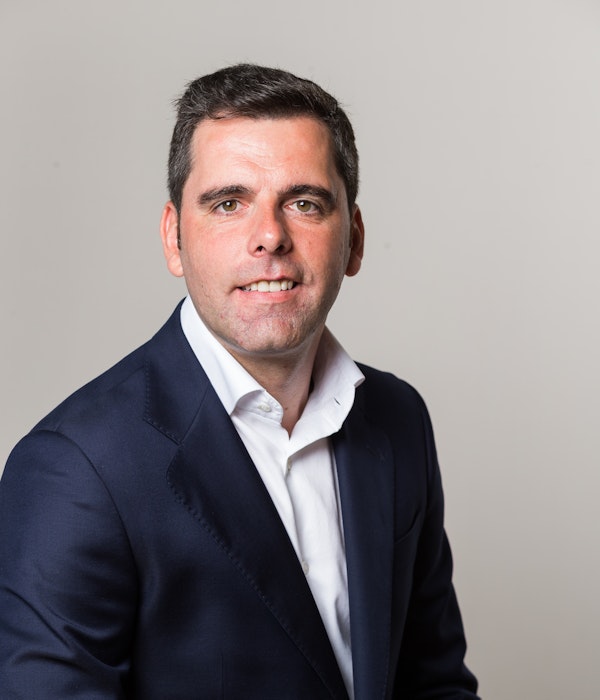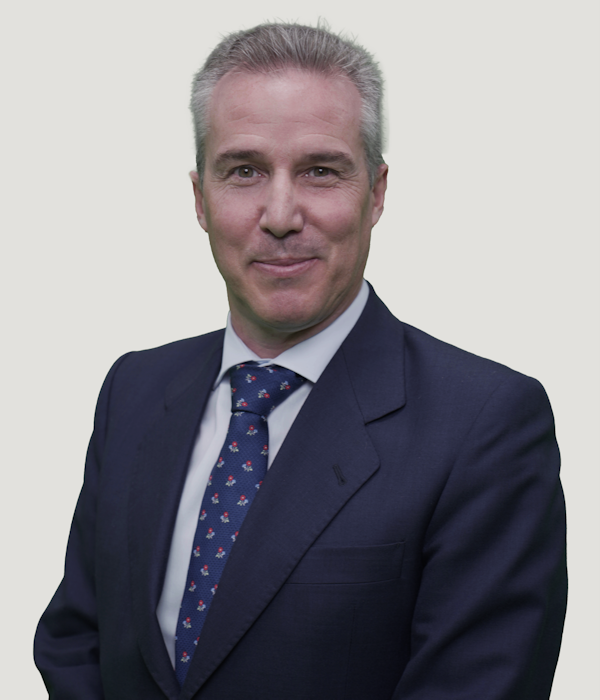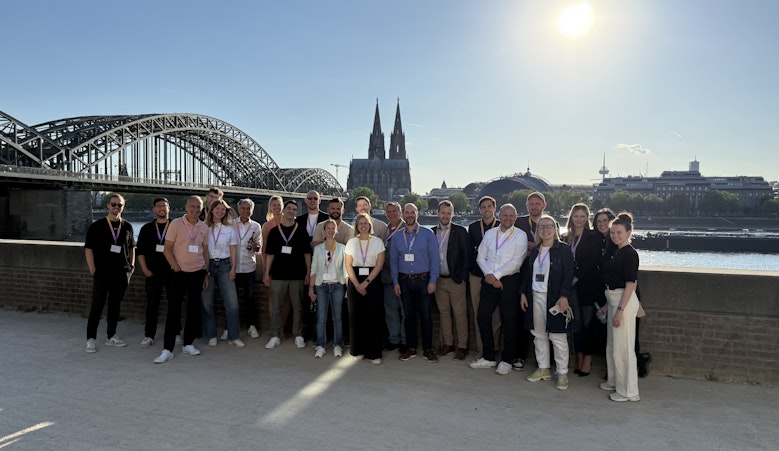
Becoming an Insurance as a Service through Reale Group's Ingood
Carlos Ordóñez, Head of Strategy & Advisory at NTT DATA EMEAL, and Miguel Cruz, Chief Digital Business Officer at Reale Group talk about developing seamless experiences to cope with the ecosystem demands and how they tried to reach a new segment of clients with Ingood.
Speakers
Carlos Ordóñez
Vicepresident, Global Insurance Innovation & Marketing
Transcription
Welcome to the NTT DATA’s Insurance Dialogs. I want to welcome Miguel Cruz, Chief Business Digital Officer at Reale Group. I want to welcome, Miguel.
Thank you very much, it is a pleasure to have the opportunity to share this moment with you, and thank you for this invitation, Carlos.
How is innovation perceived in an insurance group like Reale?
Well, it is an interesting question. But you know, from my point of view, there are mainly four types of innovation: Sustaining, Incremental, Disruptive and Radical approach.
We have to consider we are a company with a strong focus on agents and brokers. In this sense, we want to achieve a balance between our distribution and our innovation.
We have developed an incremental approach to the product and services distributed by our agencies and our brokers. However, we have developed a disruptive approach regarding the new business where we have more freedom to innovate.
Why did you decide to tackle innovation by creating Ingood from within the company? With a corporate venturing model?
We brought out Ingood looking for reaching a new segment of clients. Currently, our profile is a medium-aged man found in small/medium-sized cities. We are not able to read the digital profile or the profile located in big urban cities. The main objective of Ingood was to reach this kind of profile with our very innovative offer. This offer is based on micro-insurance because we think this new profile demands a new concept of offering, more digital, with simple and automatic processes, with the possibility to acquire this product in a very, very flexible way. This was a goal of Ingood, but besides, we wanted to extend our ability in this solution.
*Ingood *has the mission to reach agreements with different retailers or dealers in order to incorporate our product into their product. I mean, our insurance policy is embedded into their product. I'm going to buy a ticket for skiing, and I have the opportunity to buy my ticket with the service or with a product. In this case Ingood. We want to minimize the risks of fraud because, as you know, if we want to launch a B2C approach in Italy, this approach is extremely dangerous, because their fraud level is very high.
Ingood started in Spain but is now moving into the Italian market.
Spain decided to launch a new concept, in this case, Ingood, and we wanted to achieve Ingood as the digital brand of the group. In this sense, I received a call from the Chief Digital Officer of Italy, Matteo Catania, and he told me: Would you like to come here to launch Ingood in Italy?
Obviously, it was a terrific opportunity for me to be a part of this launch in Italy, but we have committed some mistakes. The first one is to try to replicate the same product in another country.
Different consumers, different markets… and the front. When I arrived in Italy, we had to replicate the same product in another country and the technical department told me: No, we can't replicate this product and if you want to replicate this product, the tariff, the final tariff will be the 10% of the final price. Excuse me? I don't understand. This is a micro-insurance product, and the aim is to buy this product very, very quickly. But we had to reduce the final price in order to extend our distribution capacity. But probably, I wasn't able to explain this fact. The first mistake is to avoid replicating the same product in another country. It works in Spain. Perhaps, it will work in Italy, but not always.
Was it a challenge to introduce a new model like this in a country where mediation is so strong?
My Italian colleagues say they are open to knowing every innovative project.
But sometimes the obstacle, the problem between potential markets, is the power of our agencies in Italy.
They are our main distribution force, but, if we want to launch a new product, first of all, we have to convince them about the necessity to launch this product.
And you know, often this is the challenge, to convince this distribution force to start a new distribution of product, is not easy.
Because they were perfect with the traditional product, Carlos. They don't need to innovate in products.
We have to admit, if we are able to put at the centre of the project, our agencies, their contribution will be key to the success of the project.
I think the problem exists if they don't want to accept this new challenge, but if they accept the challenge, then everything is easier.
How does an insurance company move towards embedded insurance and ecosystems?
As I told you, we have a problem. We are not able to reach the big cities. Our market share in Spain is more or less 5%, but if we are talking about the big city, we reduce our market share by three, almost four points.
This is a problem.
And we thought of a way to reach these big cities, without cannibalizing our agencies.
We decided to launch a new concept and new brand digital with micro-insurance because so far, our agencies are not interested in this kind of product.
Because the margin is low because the price is low. And probably we can take advantage of the purchasing moment to acquire this product. As I told you if I'm going to buy a bike and this is a great opportunity to buy an insurance policy with the bike, but the main product is not the insurance product. The main product is the bike, in this case, or the ski if you want to ski, for instance in Turin. The most complex thing was to decide about the technology.
We are not a company with strong capabilities in technology. We were looking for proper technology for Ingood, but in the end, we decided to develop this technology from scratch, and we have developed digital natively.
I don't know if it’s native. It's a new digital platform. With the ability to develop this kind of product or another kind of product because the time to market is incredible.
We have reached very cost efficiency and we have the possibility to have a factory for manufacturing new products with flexibility. Probably this is the key to this product, Carlos.
Yes, I think that the platform that you built has a modern architecture that decouples the complexity of the core insurance from the digital needs. More on the B2B2C, because to tackle this kind of business you need a B2B2C platform, and this is the platform that you built. Internally in this case because you didn't find at this moment a platform from the market that gave you this flexibility.
Yes. Because if you want to develop the B2B2C strategy, you need to develop your integration capacity for third parties, because if Ting Telecom tells us: I would like to reach an agreement with you if you are able to develop a product in three months…
This was a challenge.
This is the challenge in terms of technology, in terms of technical requirements, because you have to convince the Technical Department to reduce the number of clicks, to make the process easier for the customer. But in the end, you have to integrate with the data-driven distributor of the retail.
This is completely new for the technical department.
And also, your approach. You are approaching that as an agile methodology because as you said, you put actuarial guys with the business, with the operations, with the IT, all together defining this new concept. And this new model that sometimes as you said was new for everybody and then everybody was learning during the journey how to adapt the product to this one-click product because my customers are demanding that and this was a challenge, but it was also a success.
I agree with you. It was a challenge regarding technology, but it was a challenge regarding the procedure of working because working in agile is not very usual in Reale.
In insurance, I think.
In insurance. And it was a challenge for us, it was a challenge, and now we are trying to involve all the organization in agile methodology.
Why did you decide not to go to market with an Insurtech to launch Ingood?
Well, from my point of view, Insurtechs can be a remarkable player in the reshaping of the insurance industry.
They have provided the insurance sector with new and emerging capabilities such as artificial intelligence, machine learning, and automation, which have transformed every aspect of the insurance value chain.
However, even though, we haven't traditionally been considered a bastion of innovation.
I think that insurance companies have developed the capacity to reply to these capabilities.
In this sense, from my point of view, it only makes sense to acquire, reach an agreement or make a great investment with Insurtech, if they can't accelerate their time to market, or if the insurance company is able to scale the Insurtech model.
In this case, we didn't find any results in our research. And in the end, we decided to launch our own Insurtech in Reale. From my point of view, it was a very successful project.
Because we have learned a lot, many different things, and if we had not taken this decision, it would not be possible.
What type of insurance does Ingood focus on?
Well, our focus is on sports and personal belongings in general. The first product we launched is sports, we have launched 3-4 months ago we brought out golf, surfing, bikes...
Oh my God, I don't remember the last product.
And see. Skiing?
But our intention is to develop all the range of personal belongings. Then we want to launch musical instruments, and electronic devices… All regarding personal belonging
Accompanying your customers when they are moving, or when they need protection in their day-to-day.
The young profiles, the digital profiles, they want to insure their tablet, their guitar, their computer…
The things they love…
The most important things for him or her.
What kind of opportunity does a model like Ingood represent for your markets?
We think probably that the margin of this product, of this kind of product, is very low.
But then, you have a very great opportunity in order to do cross-selling with this client.
You can deliver this client to our traditional distribution in order to develop, in order to cross-sell this customer.
From our point of view, this is a great opportunity to extend our market.
Yes, and the engagement, because one of the key problems we have in regards to the main insurers today at the day-to-day engagement with your customers.
You have the opportunity to enhance your customer through new and simple processes and new user experiences, completely new for our clients. And then you can move these learn to our traditional processes, this is our laboratory.
Culture and talent, are the two key aspects of creating new business models.
Well, even though we decided to build our digital platform from scratch, we were aware we didn't have all the talent within our organization, in this sense, we were researching consultancy firms to support our project.
We found NTT DATA to support our project, and, from a strategic point of view, this was a very successful choice because NTT DATA had previously launched a company or a project like Ingood.
And then, we were aware we needed to capture the knowledge of people who have just worked in this kind of development or developing this kind of platform. In this case, we hired a consulting firm called FS.
This mix was successful because then we created a single team, with people from technology and people from the business area. But it was not the business team deciding what the others had to do and then the technology team developed the decision made by the business area. This team worked as a single team from my point of view.
How long did it take you to get Ingood up and running?
It took us six months to launch the project. For Reale is a very extraordinary time.
We are not talking about launching a product. We are talking about developing a new core business, for the business, for the capacity to produce, to manufacture different products in a very short period, because now we are able to launch the new product and only three weeks.
But I would like to highlight that if you want to work in an agile mode if want to launch a project in six months, it is mandatory to separate this unit from the rest of the organization.
What is it like to work in a bi-modal model where IT and Business work together?
You have to avoid contamination, both positive and negative. The contamination of the traditional way of working.
The challenge is how to integrate this small Insurtech, this internal Insurtech into the traditional company without killing the innovation. This is from my point of view the key to innovation, because probably if you are able to separate this unit, it is very easy to create new ideas, but then you need the machine you need the operation of your traditional company to accelerate the growth of this Insurtech. But how can you integrate this new business without killing innovation?
Yeah, this is a challenge, this is the main challenge.
This is the challenge.
But you can't replicate all the organization, with all departments, but obviously, if you have separated your Insurtech, but then you need, for instance, the capacity of your distribution force, you have to achieve a balance between innovation and traditional business. And from my point of view, this is the key for an Insurtech or for any project you want to launch.
How does your company combine innovation and tradition?
Reale was founded in 1894, almost 200 years ago. It is the biggest mutual in Italy and Torino, it is an institution.
Yes, but even though, if they are a 200-year company, they are able or, they have been always able to face any change. The problem is to achieve this balance, How is possible to innovate as long as you don't put in danger your traditional business? This is the key for my Italian colleagues and everybody, of course.
What are your main challenges in the medium term?
Probably, consolidate Ingood as the new digital brand for the group.
Secondly, to keep the interest in Ingood, at the beginning everything is easier, and then you have to be able to keep this interest to get the necessary budget.
And then to be able to justify the numbers of Ingood, my boss always says: Miguel, we have to justify any project with policies, because otherwise, we will be talking about innovation, but we will not be talking about profitability.
From my point of view, these are my next challenges.
I think that, of course, you will do it, because as NTT DATA we are involved in helping you on growing on that. But I think it's so interesting how this traditional insurer is moving to the new products, to the new young people, and also to the new distribution channels like B2B2C.
And how to understand how these new distributors like Telco and retailers are now key players in the insurance field and you need to do new partnerships now. Then I think you have a lot of challenges there, also to grow up a lot because the growth in the future will be coming from them.
And the ecosystems approach will be that, B2B2C, good platforms to be agile, to have a really good time to market, now in 2-3 weeks you can put new products in new channels in new customers, in new partners. I think this is something that will give you a lot of empowerment inside our companies to grow a lot in these new businesses.
Thank you very much Miguel for your time, it was a pleasure as always.
And remember that NTT DATA also will be helping you with anything that you will need from us.
It has been a pleasure for me. We have many different challenges. I do not doubt that with your help, they will be a success. Thank you very much, Carlos.
Thank you.





